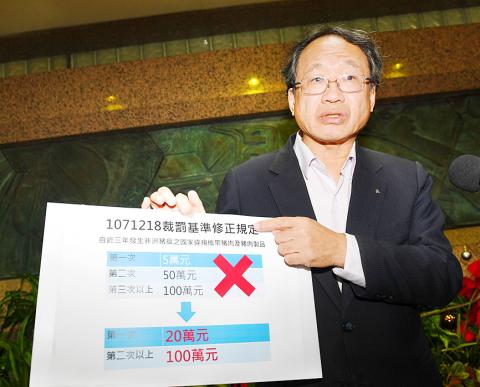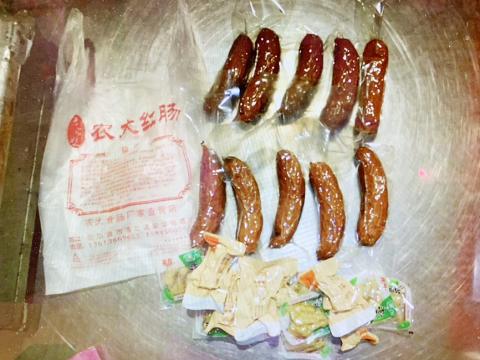A central emergency operation center to oversee efforts to prevent African swine fever contagion is to open today, while fines for people caught illegally importing pork products from virus-affected areas have been increased, the Council of Agriculture (COA) said yesterday.
As most Chinese provinces have reported cases and illegal imports of Chinese meat products continue to be intercepted by customs agents, the government will step up prevention measures, the council said.
Premier William Lai (賴清德) and other officials are to attend the center’s first meeting today, COA Deputy Minister Huang Chin-cheng (黃金城) said.

Photo: CNA
Lai would also attend a nationwide drill simulating an outbreak, which was originally scheduled for Friday, but was postponed to Wednesday next week, Huang said.
On Friday, fines for people caught illegally importing meat products from any area increased from between NT$3,000 and NT$15,000 (US$97 and US$486) to between NT$10,000 and NT$1 million.
However, those found importing pork products from virus-affected areas face a fine of NT$50,000 for the first violation, NT$500,000 for the second and NT$1 million thereafter, Huang said.

Photo courtesy of Bureau of Animal and Plant Health Inspection and Quarantine
Despite the higher fines, officials had intercepted 41 illegal meat imports since Friday, of which 15 were pork products from China or other affected areas, which prompted the council to revise the fines, Huang said.
From today, people face a fine of NT$200,000 for the first instance of illegal imports from affected areas and NT$1 million for subsequent breaches, Huang said.
While the council has said its data showed that most of those caught illegally importing meat products were Taiwanese, many of them were Chinese or Vietnamese spouses of Taiwanese traveling on Republic of China (ROC) passports, Huang said.
The council would ask airlines to increase inflight broadcasts of its policies in Vietnamese and boost policy promotion among local associations, he said.
Meanwhile, netizens have reported receiving pork products as “gifts” with online purchases in parcels delivered from China without being told that they would be included, Huang said.
People who receive such items must contact their local animal quarantine bureau to have them properly disposed of, not dump the products themselves, Huang said.
There is no penalty for failing to report such items, he said.
The council is working on ways to detect meat products in parcels at customs, he said.
If pork products carrying the virus are consumed by pigs, it could ruin the nation’s hog industry, the council has said.
It could take decades for the industry to recover, as there is no vaccine for the fatal disease, it has said.
Separately yesterday, Mainland Affairs Council (MAC) Minister Chen Ming-tong (陳明通) accused China of mismanaging the outbreak.
China’s failure to bring the disease under control could deal a heavy blow to Taiwan’s hog industry, Chen said.
“The epidemic is a very serious matter,” he said, adding that Beijing has lost control of the situation.
“China has mismanaged the situation, which has forced Taiwan to step up management and inspection,” he said at a meeting of the legislature’s Internal Administration Committee.
The MAC has asked Beijing three times to hold bilateral talks on measures to combat the disease, including banning e-commerce platforms from selling foreign pork products, with the latest request issued on Dec. 14, Chen said.
“However, the Chinese side has yet to respond,” he said, urging Beijing to set aside political considerations to fight the epidemic.
Additional reporting by CNA

AIR SUPPORT: The Ministry of National Defense thanked the US for the delivery, adding that it was an indicator of the White House’s commitment to the Taiwan Relations Act Deputy Minister of National Defense Po Horng-huei (柏鴻輝) and Representative to the US Alexander Yui on Friday attended a delivery ceremony for the first of Taiwan’s long-awaited 66 F-16C/D Block 70 jets at a Lockheed Martin Corp factory in Greenville, South Carolina. “We are so proud to be the global home of the F-16 and to support Taiwan’s air defense capabilities,” US Representative William Timmons wrote on X, alongside a photograph of Taiwanese and US officials at the event. The F-16C/D Block 70 jets Taiwan ordered have the same capabilities as aircraft that had been upgraded to F-16Vs. The batch of Lockheed Martin

US President Donald Trump yesterday announced sweeping "reciprocal tariffs" on US trading partners, including a 32 percent tax on goods from Taiwan that is set to take effect on Wednesday. At a Rose Garden event, Trump declared a 10 percent baseline tax on imports from all countries, with the White House saying it would take effect on Saturday. Countries with larger trade surpluses with the US would face higher duties beginning on Wednesday, including Taiwan (32 percent), China (34 percent), Japan (24 percent), South Korea (25 percent), Vietnam (46 percent) and Thailand (36 percent). Canada and Mexico, the two largest US trading

GRIDLOCK: The National Fire Agency’s Special Search and Rescue team is on standby to travel to the countries to help out with the rescue effort A powerful earthquake rocked Myanmar and neighboring Thailand yesterday, killing at least three people in Bangkok and burying dozens when a high-rise building under construction collapsed. Footage shared on social media from Myanmar’s second-largest city showed widespread destruction, raising fears that many were trapped under the rubble or killed. The magnitude 7.7 earthquake, with an epicenter near Mandalay in Myanmar, struck at midday and was followed by a strong magnitude 6.4 aftershock. The extent of death, injury and destruction — especially in Myanmar, which is embroiled in a civil war and where information is tightly controlled at the best of times —

China's military today said it began joint army, navy and rocket force exercises around Taiwan to "serve as a stern warning and powerful deterrent against Taiwanese independence," calling President William Lai (賴清德) a "parasite." The exercises come after Lai called Beijing a "foreign hostile force" last month. More than 10 Chinese military ships approached close to Taiwan's 24 nautical mile (44.4km) contiguous zone this morning and Taiwan sent its own warships to respond, two senior Taiwanese officials said. Taiwan has not yet detected any live fire by the Chinese military so far, one of the officials said. The drills took place after US Secretary